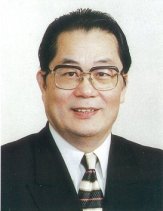Chiang Peng-chien
Chiang Peng-chien Kang Pêng-kian | |
|---|---|
 | |
| 1st Chairperson of the Democratic Progressive Party | |
| In office 28 November 1986 – 20 December 1987 | |
| Preceded by | Position established |
| Succeeded by | Yao Chia-wen |
| Member of the Control Yuan | |
| In office 11 March 1993 – 15 December 2000 | |
| 4th Secretaries-General of the Democratic Progressive Party | |
| In office September 1992 – December 1993 | |
| Personal details | |
| Born | 25 April 1940 Daitōtei, Taihoku Prefecture, Japanese Taiwan |
| Died | 15 December 2000 (aged 60) Taipei, Taiwan |
| Nationality | |
| Political party | Democratic Progressive Party |
| Alma mater | National Taiwan University |
| Occupation | Politician |
| Profession | Lawyer |
Chiang Peng-chien (Chinese: 江鵬堅; pinyin: Jiāng Péngjiān; Wade–Giles: Chiāng P'éng-chiēn; Pe̍h-ōe-jī: Kang Pêng-kian; 25 April 1940 – 15 December 2000) was the co-founder and first chairperson of the Democratic Progressive Party. Chiang was elected a member of the Legislative Yuan in 1983 and became a member of the Control Yuan in 1996.
Early life
Chiang Peng-chien was born April 25, 1940, in Daitōtei, Taihoku Prefecture, Japanese-era Taiwan. His father was a shoemaker from Fujian, China.[1]
In 1955, Chiang entered the Taipei Municipal Jianguo High School. He was then accepted to National Taiwan University, majoring in law. After graduation, he passed the bar examination in 1964.[2] Chiang began practicing law after earning his master's degree.
Chiang advocated for human rights. He founded the Taiwan Association for Human Rights. On the 1979 Human Rights Day (December 10), members of the Formosa Magazine and other Tangwai pro-democracy advocates went on a demonstration. Many of the participants were arrested by the government and tried in military court. Chiang defended Lin Yi-hsiung, one of the Kaohsiung Eight.[3]
Political career
Chiang became involved in politics and supported the Tangwai movement. He was elected a member of the Legislative Yuan in 1983.[4] In September 1986, about 130 pro-democracy advocates, including Chiang, gathered at the Grand Hotel in Taipei to establish the Democratic Progressive Party (DPP). On November 10, 1986, he was elected the first chairperson of the party.[4]
In 1994, Chiang was a candidate for the DPP's nomination in the 1994 Taipei mayoral election. He competed against legislators Chen Shui-bian and Frank Hsieh and lost.[5] In 1996, Chiang became a member of the Control Yuan. He worked to prevent any activities associated with black gold and actively investigated sensitive cases involved with former political oppression.[4]
Death and legacy
Chiang died in December 2000 of pancreatic cancer.[3] His widow Peng Feng-mei donated his writings and books to the Academia Historia for display.[6]
References
- ^ 從靴匠之子到民進黨創黨主席——第一屆黨主席江鵬堅 (Press release) (in Chinese). China.com.cn. February 5, 2005. Retrieved June 16, 2008.
- ^ 民主進步黨. Democratic Progressive Party (in Chinese). Archived from the original on June 10, 2008. Retrieved June 16, 2008.
- ^ a b Huang, Joyce (December 16, 2000). "First chairman of DPP dies of pancreatic cancer". Taipei Times. p. 3.
- ^ a b c 名士風格江鵬堅 一身傲骨孤獨行 (Press release) (in Chinese). New Taiwan Weekly. December 15, 2000. Archived from the original on July 18, 2011. Retrieved June 22, 2008.
- ^ 民進黨歷任黨主席 與扁政府的互動關係. Liberty Times (Press release) (in Chinese). Taiwan (ROC). August 10, 2006. Retrieved June 22, 2008.
- ^ Chuang, Jimmy (November 16, 2001). "Museum celebrates contributions of late democracy activist". Taipei Times. p. 2.
- 1940 births
- 2000 deaths
- Democratic Progressive Party chairpersons
- Politicians of the Republic of China on Taiwan from Taipei
- National Taiwan University alumni
- Taiwanese human rights activists
- Taiwanese people of Hoklo descent
- Democratic Progressive Party Members of the Legislative Yuan
- Members of the 1st Legislative Yuan in Taiwan
- Deaths from pancreatic cancer
- Party List Members of the Legislative Yuan
- Deaths from cancer in Taiwan
- Taiwanese political party founders
- Taiwanese Members of the Control Yuan
- Members of the 2nd Legislative Yuan
